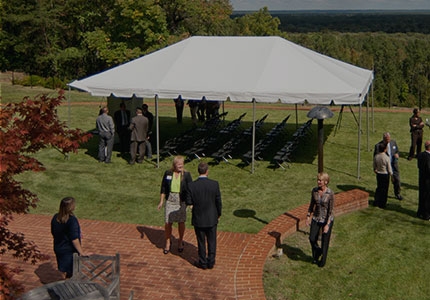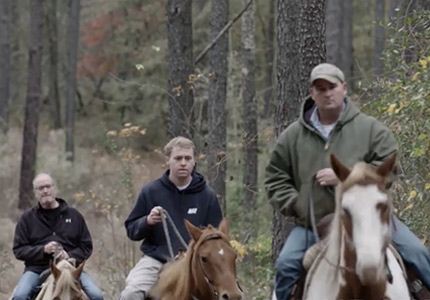Bluff’s equine therapy program is featured in People
Emily Davidoff overdosed on heroin 26 times before ending up in rehab in July of 2015. “I was trying to kill myself,” the 24-year-old, now 10 months sober, tells PEOPLE.
Emily Davidoff overdosed on heroin 26 times before ending up in rehab in July of 2015.
“I was trying to kill myself,” the 24-year-old, now 10 months sober, tells PEOPLE. “I didn’t care about my life and I didn’t care about anybody else.”
“This horse had a story just like mine – she was abandoned and alone,” Emily recalls. “I never knew I could bond with an animal like that but I cried on that horse before I cried in front of anybody else.”
Emily made this connection through Bluff’s equine therapy program in Augusta, Georgia. Led by therapist Dale Phillips, the program aims to help individuals suffering from drug and alcohol addiction reexamine their past and behaviors through interacting with and caring for horses.
As Phillips explains, equine therapy often restores feelings people in the throes of addiction feel have been lost, like trust and responsibility.
“First thing’s first, to work with a horse you’ve got to earn its trust,” Philips, 36, says. “Anybody can saddle up a horse and ride him but to really, really have that connection you have to do the work.”
“And that’s how I set it up. I don’t give anybody that privilege until they’ve earned it,” he continues.
A Simple Way
Phillips knows how working with horses can transform lives because he’s lived it himself. After being sexually abused beginning at 6 years old, Philips says his horse became “the only friend I had.”
“I don’t know what it was about her but even at times when I felt suicidal, she always showed up when no one else did,” he says.
“Up until that point, I had never shared what had happened to me with anyone, but she gave me hope,” he recalls. “She taught me how to use what I already knew – working with horses and plants and growing stuff and having a simple way of life – to help myself heal.”
“I told her, ‘If I ever get all this stuff you’re telling me I’ll spend the rest of my life trying to give it back,’ ” he continues.
Now, Phillips has dedicated his life to paying that woman’s kindness forward. After becoming certified in equine-assisted psychotherapy, Phillips went on to launch four equine therapy programs at treatment centers around the U.S.
“It’s just a simple way of doing things,” he explains. “It’s about getting up in the morning and having something to take care of and a sense of responsibility – a horse will give you that.”
A Horse’s Story
In addition to giving back what has been lost, the horses help individuals in treatment better understand their own behaviors. Many of the horses used in Phillips’ program are former racehorses or have been rescued from abusive situations. The trauma the horses once suffered is easily relatable to the people in the programs, who are often able to see their own behaviors reflected back at them.
“For the longest time I was scared of one of the horses because she would try to bite me all the time,” recalls Emily. “Then Dale pulled me aside and said she was trying to push me away the same way I pushed away people in my life.”
“We were on the same level,” she continues. “As crazy as it sounds, that horse and me bonded in a spiritual way.”
Phillips says he always tries to keep the horses’ backgrounds to himself until patients have formed bonds.
“I let the people in treatment form that relationship first because I want them to see that horse being successful and loving and gentle and caring,” he says. “Only once the person has fallen in love with that horse do I tell them what exactly they’re loving on.”
The horses aren’t the program’s only source of hope. Phillips inspires his patients by sharing his childhood abuse, the anger he carried for 20 years and how he found a way to use his struggle to help others.
“He was so open about the situation he was in and seeing how he came so far it made me feel like I don’t have to carry so much shame about my own abuse,” says Emily.
“He shared his experience growing up and what he did to fix it and that showed me that there is hope,” adds former patient Richard Spence, 30, who sought treatment for addiction to opiates and has now been sober for 9 months. “No matter what you’ve been through, there’s always hope.”
Phillips plans to keep spreading that hope for as long as he can.
“If one person gets, it then it’s all been worth it,” he says. “I learned years ago that your story could save someone’s life so you can’t keep it inside. I’ve been able to help hundreds of people and I know that given the opportunity, people recover.”








